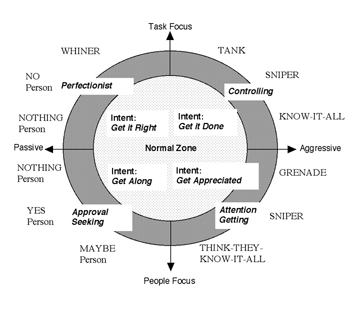Once someone determines that what they want is NOT happening, or that what they don’t want IS happening, his or her behavior becomes more extreme, and therefore less tolerable to others. We now can observe how threatened or thwarted positive intentions lead to the behaviors of difficult people.
THREATENED INTENT TO ‘GET IT DONE’:
Through the distorted lens of the thwarted intent to ‘Get It Done,’ others appear to be wasting time, going off on tangents, or just plain taking too long. The intent increases in intensity, and the subsequent behavior becomes more controlling. The three most difficult controlling behaviors are the Tank, Sniper, and Know-It-All.
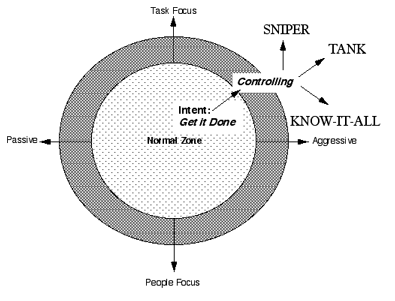
THE TANK
On a mission, unable to slow down, pushing you around or running right over you, the Tank has no inhibitions about ripping you apart personally. Yet the irony is... it's nothing personal. You just happened to get in the way. In an effort to control the process and accomplish the mission, Tank behavior ranges from mild pushiness to outright aggression.
THE SNIPER
A sneakier strategy when things aren't getting done to their satisfaction, the Sniper attempts to control you through embarrassment and humiliation. Most people live in fear of public embarrassment, a fact that Snipers use to their advantage, by making loaded statements and sarcastic comments at times when you are most vulnerable.
THE KNOW-IT-ALL
The Know-It-All controls people and events by dominating the conversation with lengthy, imperious arguments, and eliminates opposition by finding flaws and weaknesses to discredit other points of view. Because the Know -It-All is actually knowledgeable and competent, most people are worn down quickly by this strategy, and finally just give up.
THREATENED INTENT TO ‘GET IT RIGHT’
Through the distorted lens of the thwarted intent to ‘Get It Right,’ everything around this person begins to seem haphazard and careless. To add insult to injury, people seem to address these concerns with horrifyingly fuzzy words, like ‘pretty much,’ and ‘roughly,’ and ‘probably.’ When sufficient intensity is reached, the behavior becomes increasingly pessimistic and perfectionistic. The Constant Complainer, the No-Person, and the Nothing-Person, all exemplify this kind of behavior.
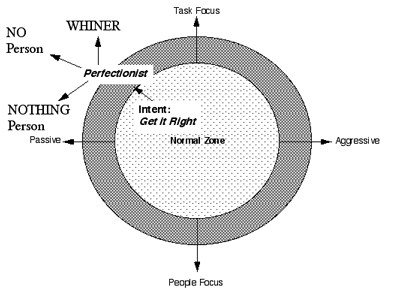
THE WHINER
In our imperfect world, the Whiner believes that he or she is powerless to create change. Burdened and overwhelmed by all the uncertainty around what can go wrong, they abandon all thought of solutions. Instead, as the feeling of helplessness increases, they focus on any problems that can be used as evidence for their massive generalization. They begin to whine: “Ooooooooo....nothing is right. Everything is wroooong.” This, of course, serves only to drive everybody else crazy, and the deteriorating situation provokes further whining.
NO PERSON
Unlike the Constant Complainer, the No Person does not feel helpless in the face of things going wrong. Instead, the No Person becomes hopeless. Certain that what is wrong will never be set right, they have no inhibition about letting others know how they feel: "Forget it, we tried that, it didn't work then, it won't work now, and you're kidding yourself if anyone tells you different. Give up and save yourself from wasted effort on a lost cause." This gravity well pulls others into the No Person's personal pit of despair.
NOTHING PERSON
When events fail to meet to measure up to the standard of perfection, some people get so totally frustrated that they withdraw completely. There may be one last shout at the powers that be for failing to ‘Get It Right’: “Fine! Do it your way. Don't come crying to me if it doesn't work out!” From that point on, they do and say...Nothing.
THREATENED INTENT TO ‘GET ALONG’ WITH OTHERS
Through the distorted lens of the thwarted intent to ‘Get Along’ with people, uncertainty about how others feel about them leads them to take reactions, comments and facial expressions personally. Behavior becomes increasingly geared towards gaining approval and avoiding disapproval. The three most difficult approval-seeking behaviors are the wishy-washy Yes and Maybe People and the passive Nothing Person.
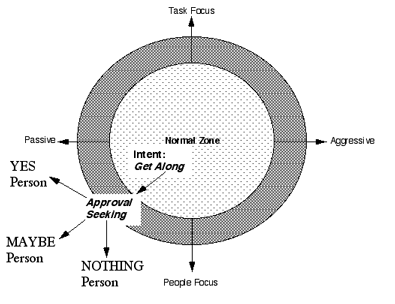
THE NOTHING PERSON
Timid, uncomfortable and uncertain, the ‘Get Along’ Nothing Person excels at tongue biting. Since they don’t have anything nice to say, they don’t say anything at all. At their worst, they say nothing almost all the time. This, in many ways, is the perfect strategy to avoid conflict, to avoid hurting someone else's feelings. and to keep from angering anyone. It's almost a perfect plan, but there is a fly in the ointment. Since the Nothing Person can't relate authentically or speak honestly, he or she doesn't really ‘Get Along’ with anyone.
THE YES PERSON
Yes People seek approval and avoid disapproval by trying to please everyone else. The Yes Person answers yes to every request, without actually thinking about what is being promised or the consequences of failing to follow through. “Sure,” says the Yes Person. And to the next request, “Ok,” and to the next request...“Of course.” Before long, the Yes Person has over promised and under delivered to such an extent that the very people he or she wanted to ‘Get Along’ with are furious. In the rare instance where the promises are kept, the Yes Person's life is no longer their own, because all their choices are made around everyone else's needs and demands. This produces in the Yes Person a deep-seated anxiety and much resentment, and can even lead to unconscious acts of sabotage.
THE MAYBE PERSON
The Maybe Person avoids disapproval by avoiding decisions. After all, the wrong choice might upset someone, or something could go wrong and who would be blamed? The solution is to put the decision off, waffle and hedge until someone else makes the decision or the decision makes itself. Like all the other difficult behaviors, this behavior perpetuates the problem it is intended to solve, by causing so much frustration and annoyance that the Maybe person is locked out from meaningful relationships with others.
THREATENED INTENT TO GET APPRECIATED BY PEOPLE
Through the distorted lens of a thwarted intent to ‘Get Appreciation’ from people, the lack of positive feedback combines in their mind with the reactions, comments and facial expressions of others, and tend to be taken personally. The intent to Get Appreciation’ intensifies in direct proportion to the lack of appreciative feedback, and behavior becomes increasingly aimed at getting attention. The three most difficult attention getting behaviors that result from the thwarted desire to get appreciation are the Grenade, The Sniper and The Think-They-Know-It-All.
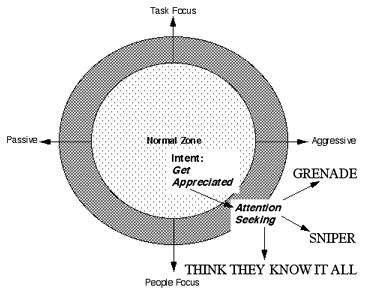
GRENADE BEHAVIOR
They say they don’t get any appreciation and they’re not getting any respect. When the the silence and lack of appreciation becomes deafening. Look out for the Grenade: The adult temper tantrum. “KABOOM!!@#$* Nobody around here cares! That's the problem with the world today, KAPOW *%^&@# I don't know why I even bother! No one appreciates just how hard it is for me! KATUNG&%$#*, etc.” Ranting and raving are difficult to ignore. But since this desperate behavior produces negative attention and disgust, the Grenade is ever more likely to blow up at the next ‘provocation.’1
THE FRIENDLY SNIPER
This Sniper actually likes you, and their sniping is a ‘fun way’ of attention. “I never forget a face...but in your case I will make an exception.” Many people have relationships that include playful sniping. Normally, the best defense is a good offense, because instead of offending, a return snipe is a sign of appreciation. But if the person on the receiving end doesn't give or receive appreciation in this manner, they may be laughing on the outside while bleeding from an emotional wound on the inside.
THINK-THEY-KNOW-IT-ALL BEHAVIOR
The Think-They -Know -It- All, a specialist in exaggeration, half truths, jargon, useless advice and unsolicited opinions. Charismatic and enthusiastic, this desperate-for-attention person can persuade and mislead an entire group of naive people into serious difficulties. If you argue with them, they turn up the volume and dig in their heels, then refuse to back down till you look as foolish as they do.
TO SUMMARIZE:
* Behavior becomes more controlling when the intent to ‘Get It Done’ is thwarted, leading people to become Tanks, Snipers, and Know-It-Alls.
* Behavior becomes more perfectionist when the intent to ‘Get It Right’ is thwarted, leading people to become Whiners, No People, and Nothing people.
* Behavior becomes more approval seeking when the intent to ‘Get Along’ is thwarted, leading people to become Yes People, Maybe People, and Nothing people.
* Behavior becomes more attention-getting when the intent to ‘Get Appreciation’ is thwarted, leading people to become Grenades, Think-They-Know-It-Alls, and Snipers.
As you read these descriptions of the 10 difficult behaviors that people can’t stand, perhaps you noticed that, when your intentions are thwarted, you occasionally become some of these people too. We wouldn’t be surprised, since everybody is somebody’s difficult person some of the time. Who hasn’t whined, complained, become hopeless, exaggerated a story, with-held their true feelings, procrastinated a decision, lost their temper, loudly accused or withdrawn completely? The difference between you and your difficult people in this regard may be a matter of degree and frequency, or recognition and responsibility. But the essential point here is that these behaviors are observable and changeable.
The behavior of the person you can’t stand is determined by that person’s perception of what they think is going on as it relates to what they think is important. Their behavior interacts with your behavior, which is based on your own perception of these same variables. This produces an outcome, either randomly or intentionally. The results of your dealings with people at their worst is, in large measure, up to you.






